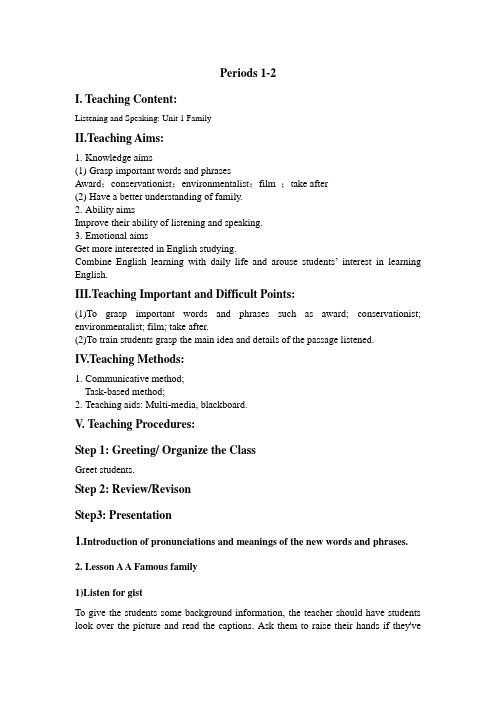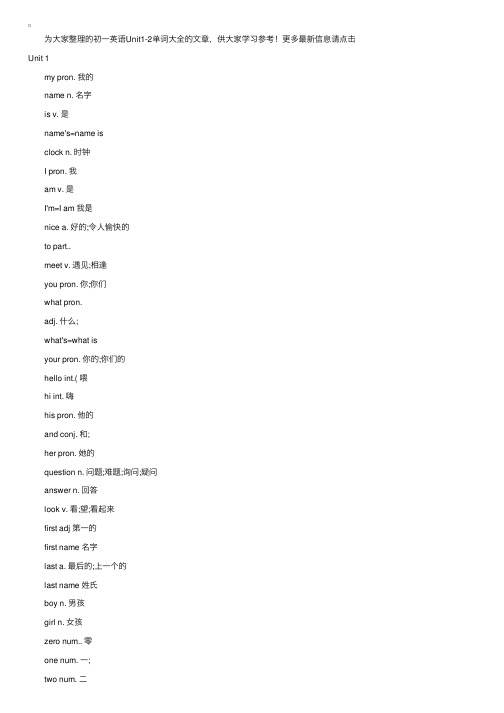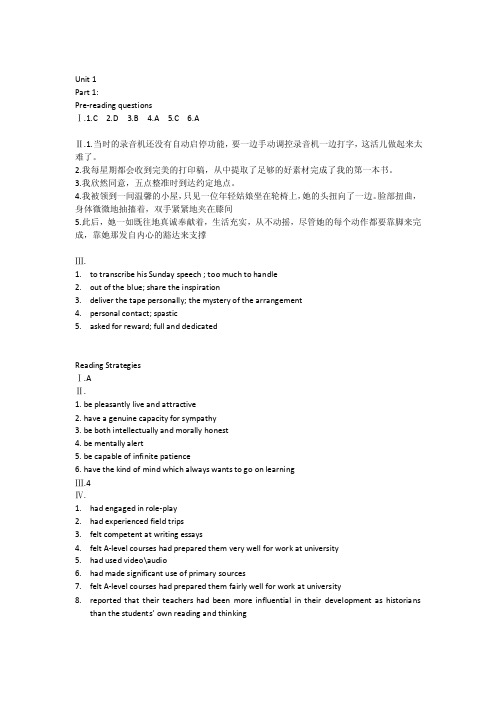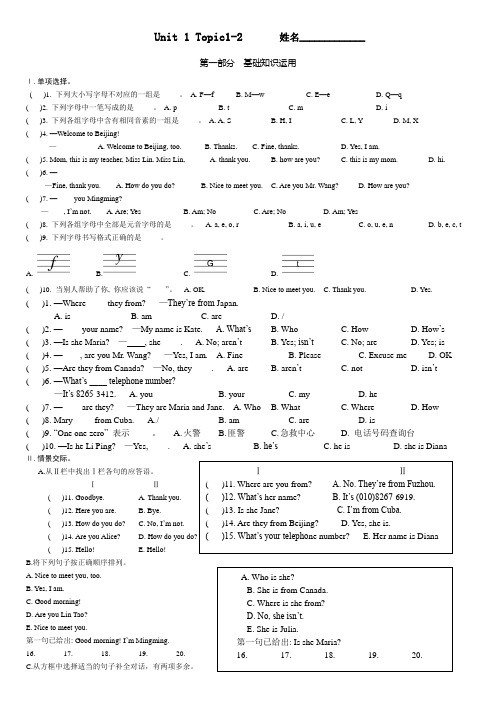Unit 1 1-2
大学英语教案unit1 period1-2

Periods 1-2I. Teaching Content:Listening and Speaking: Unit 1 FamilyII.Teaching Aims:1.Knowledge aims(1)Grasp important words and phrasesAward;conservationist;environmentalist;film ;take after(2)Have a better understanding of family.2.Ability aimsImprove their ability of listening and speaking.3.Emotional aimsGet more interested in English studying.Combine English learning with daily life and arouse students’interest in learning English.III.Teaching Important and Difficult Points:(1)To grasp important words and phrases such as award; conservationist; environmentalist; film; take after.(2)To train students grasp the main idea and details of the passage listened.IV.Teaching Methods:municative method;Task-based method;2.Teaching aids: Multi-media, blackboard.V. Teaching Procedures:Step 1: Greeting/ Organize the ClassGreet students.Step 2: Review/RevisonStep3: Presentation1.Introduction of pronunciations and meanings of the new words and phrases.2. Lesson A A Famous family1)Listen for gistTo give the students some background information, the teacher should have students look over the picture and read the captions. Ask them to raise their hands if they'veheard of Jacques Cousteau or any of his family members. Elicit predictions about how Jacques Cousteau and Alexandra Cousteau are related. The aim of the first listening is to catch the main idea of the material.2)Listen for detailsPoint out that they need to match the years with events.3.Lesson B Brazil’s Changing Families1)Pre-listening taskRead the following question and discuss with a partner.In what ways has the makeup of the Brazilian family changed in recent times?2)Listen for gist.Listen to the recording once and answer the questions on the book. Tell students that they are going to listen to how family size in Brazil is changing.3)Listen for detailsTo help students achieve maximum understanding of the material.Step 4: ConsolidationAsk students to tell the main ideas of each material.Step 5: Assignment/ homeworkAsk students to review the important words and phrases .VI.Teaching ReflectionStudents’ listening ability is not very good, they need a lot of practice to improve listening and speaking. The teacher should do more practice.。
仁爱英语八年级上册unit1 topic1-2基础题

1.---I s Lily going to _____ a scientist when she grows up?---Yes, she ______.A. be; isB. Be; beC. is; isD. is; be2.---Look .My brother is good at _______ ---Yes, I think so.A. play tennisB. plays tennisC. playing tennisD. to play tennis3.---Where is Alice? --- I think she is in the dormitory. I saw her _______ our classroom just now.A. to pass B passed C pass D passes4.---Bruce, do you skate_______?---No. Seldom.A manyB muchC moreD most5.Does she often practice________ in the afternoon? ---Yes, he doseA skateB skatesC skating D. to skate6.---Would you like to come and cheer Jim on?---_________A Yes, I will B. Yes, I would C. Sure, I’d love to D. Yes , I do7.I am sorry that I can’t be with you for long, because I _______ Beijing tomorrow.A. leave for B am leaving for C leaves for D leaving for8.We must keep the classroom _______ because we’re going to have an English party tomorrow.A cleanB to cleanC cleaningD cleaned9.Would you mind ______ the room? --- Certainly not. I’ll do it right away.A cleanB cleanedC cleaning Dm to clean10.The students like English and have fun _______ itA learningB learnC to learnD on learning11.----Could you please _____ your homework _____ me tomorrow?---Sure.\A bring; /B take;/C take; toD bring; to12---I think you will do _____next time. ---- I think so.A goodB betterC bestD the best13---I am sorry I broke your pen. Let me buy you a new one. ---_____I have another one.A Never mindB You’re welcomeC ThanksD OK14.---Why were you late for the meeting this morning? ---- I got up late, so I ______ the first bus.A. caught B missed C took D forgot15 The teacher is very angry ______ him ______ what he said.A with; atB in; withC at ; withD with; to16 Michael missed a good chance, but he did _______ best _______ it.A him; to playB he; playedC his; to playD his; playing17--- How delicious the cake is! ---I’m glad you like it. Would you like to have _____one?A anotherB othersC the otherD other18 Both his sister and his brother _______ basketball players.A isB amC areD be19 The bad weather stopped us from _______ hikingA goB goesC to goD going20 A large number of children ______ watching TV. My son likes, too.A likesB likeC likedD to like21 My sister __________ (become ) a teacher two years ago.22.James Narsmith was from __________. He was a ____________(Canada)23.Thomas Edison_______________ many inventions. He was a great __________ (invent).24.They are sure _________ (come) tonight.25.He enjoys _________(read) books after supper.26.---______ you______ (go) to my party next week? ----Yes, I am27.Jim prefers ________(fish) to _______(boat).28.Our plane ______________(fly) to Beijing at ten o’clock tonight.29.The boy spends much time _________ (play) computer games.30.The train ________(arrive ) at the station at this time every day.31.---Do they go _______(cycle) every Saturday? ---Yes, they do.32.We _____________(have) an English party this weekend. I hope you can come.33.I spent three hours in _________(make ) a kite.34.He did very _________(good)35.Eating more fruits is good for your _______(healthy).36.Jane keeps _______(send) an e-mail to her good friends every week.37.The students always have fun ________ (sing) English songs.38.----Will you ________(play) the piano ________(quiet)? It’s too noisy.---sorry. I ________(try) to play it more quietly.39.to, play, going, afternoon, are, basketball, this, you_________________________________________________________________________?40 spends, she, hour, exercising, the, day, half, gym, every, an, in____________________________________________________________________________.41.saying, about, to, Jane, what, sorry.________________________________________________________________________________?42. important, you, every, it, for, to, English, read, is, day__________________________________________________________________________.43.今天下午在我们学校有一场篮球比赛。
2023年一轮课本复习 八上Unit 1-Unit 2

way to relax is through
exercise .
15.我想知道过去这里的生活是怎样的。
I wonder what life was
like here in the past.
16.她通常每天看两个多小时电视。
She usually watches TV for more
than two hours a day.
上一页 返回导航 下一页
30.such(adj.& pron.) 这样的;那样的;类似的 31.together(adv.) 在一起;共同 32.杂志;期刊(n.) magazine 33.然而;不过(adv.) however 34.几乎;差不多(adv.) almost 35.得分;点(n.) point 36.none(pron.) 没有一个;毫无 37.body(n.)身体
上一页 返回导航 下一页
3.wonder [详见 P54] v.想知道;琢磨 n.惊叹;奇迹;奇观 4.swing n.摆动;秋千 v.(使)摆动;摇摆 例:The kids were playing on the swings.孩子们在荡秋千。(n.) His arms swung as he walked.他边走边摆着双臂。(v.)
上一页 返回导航 下一页
23.咖啡(n.) coffee 24.结果;后果(n.) result 25.online(adj.& adv.)在线(的);联网(的) 26.television(n.) 电视节目;电视机 27.虽然;尽管;即使(conj.) although 28.以;凭借;穿过(prep.) through 29.头脑;心智(n.) mind
DREAM
中 考 加油
Unit 1-Unit 2(九年级全册)-2023届中考英语一轮大单元复习课件 (人教版)

4.wise(adj.)→ wisely (adv.)明智地;聪明地;有见识地★ 5.strange(adj.)→ stranger (n.)陌生人;外地人★ 6.steal(v.)→ stole (过去式) → stolen (过去分词)偷;窃取 7.warm(adj.)→ warmth (n.)温暖;暖和★ 8.punish(v.)→ punishment (n.)处罚;惩罚★ ▲punish sb.for(doing) sth.因(做)某事而惩罚某人
5.business n.生意;商业 n.事情;职责;职业 It's none of your business.那不关你的事。(n.) I don't have a head for business.我没有商业头脑。(n.)
6.review n.回顾;复习;评论;检讨;检阅 v.回顾;复习;重新调查 例:After she finished reading the book,Alice wrote a review for the school newspaper.艾丽斯读完这本书后,给学校报纸写了评论。(n.) Review what you learned last class as quickly as you can before the class begins.课前尽可能快地温习你上节课学的内容。(v.)
2.note n.笔记;记录;便条;音符;纸币 v.注意;指出 例:She left a note for Mike on the table.她在桌子上给迈克留了张便条。 (n.)
Don't bother me.I am taking notes.不要打扰我。我正在做笔记。(n.) I have nothing in the world but a million-pound note.除了一张百万英 镑的钞票,我一无所有。(n.) Please note that the office will be closed on Monday.请注意办事处星期 一将关闭。(v.)
初一英语Unit1-2单词大全

为⼤家整理的初⼀英语Unit1-2单词⼤全的⽂章,供⼤家学习参考!更多最新信息请点击Unit 1 my pron. 我的 name n. 名字 is v. 是 name's=name is clock n. 时钟 I pron. 我 am v. 是 I'm=I am 我是 nice a. 好的;令⼈愉快的 to part.. meet v. 遇见;相逢 you pron. 你;你们 what pron. adj. 什么; what's=what is your pron. 你的;你们的 hello int.( 喂 hi int. 嗨 his pron. 他的 and conj. 和; her pron. 她的 question n. 问题;难题;询问;疑问 answer n. 回答 look v. 看;望;看起来 first adj 第⼀的 first name 名字 last a. 最后的;上⼀个的 last name 姓⽒ boy n. 男孩 girl n. ⼥孩 zero num.. 零 one num. ⼀; two num. ⼆ three num. 三 four num. 四 five num. 五 six num. 六 seven num. 七 eight num. ⼋ nine num 九 telephone n.,电话 number n. 数;数字 telephone number 电话号码 phone n. 电话 phone number 电话号码 it pron. 它 it's=It is card n. 卡;卡⽚ ID card n. ⾝份证 family a n. 家; 家庭 family name 姓⽒ Jenny 詹妮(⼥名) Gina 吉娜(⼥名) Alan 艾伦(男名) Mary 玛丽(⼥名) Jim 吉姆(男名) Tony 托尼(男名) Tom 汤姆(男名) Bob 鲍勃(男名) Mike 迈克(男名) Green 格林(姓) Miller ⽶勒(姓) Jack 杰克(男名) Smith 史密斯(姓) brown 布朗(布朗) Linda 琳达(⼥名) Nick 尼克(男名) Kim ⾦(⼥名) Hand 汉德(姓)。
新标准大学英语1阅读教程1答案(Unit1-Unit2)

Unit 1Part 1:Pre-reading questionsⅠ.1.C 2.D 3.B 4.A 5.C 6.AⅡ.1.当时的录音机还没有自动启停功能,要一边手动调控录音机一边打字,这活儿做起来太难了。
2.我每星期都会收到完美的打印稿,从中提取了足够的好素材完成了我的第一本书。
3.我欣然同意,五点整准时到达约定地点。
4.我被领到一间温馨的小屋,只见一位年轻姑娘坐在轮椅上,她的头扭向了一边。
脸部扭曲,身体微微地抽搐着,双手紧紧地夹在膝间5.此后,她一如既往地真诚奉献着,生活充实,从不动摇,尽管她的每个动作都要靠脚来完成,靠她那发自内心的豁达来支撑Ⅲ.1.to transcribe his Sunday speech ; too much to handle2.out of the blue; share the inspiration3.deliver the tape personally; the mystery of the arrangement4.personal contact; spastic5.asked for reward; full and dedicatedReading StrategiesⅠ.AⅡ.1. be pleasantly live and attractive2. have a genuine capacity for sympathy3. be both intellectually and morally honest4. be mentally alert5. be capable of infinite patience6. have the kind of mind which always wants to go on learningⅢ.4Ⅳ.1.had engaged in role-play2.had experienced field trips3.felt competent at writing essays4.felt A-level courses had prepared them very well for work at university5.had used video\audio6.had made significant use of primary sources7.felt A-level courses had prepared them fairly well for work at university8.reported that their teachers had been more influential in their development as historiansthan the students’ own reading and thinking1.Despite her blindness, the author’s mother never fails to amaze her children with herknowledge of what is going on around her. For them she seems to know everything2.The moment she touched the dead bird, she screamed and drew back her hand immediately.Then she ordered the author and the bird outside and admonished her never to let her touch such a thing again.3.She was aware of the dog’s presence because she heard its toenails clicking on the bedroomfloor4.She was trying to tell her children that she knew everything about them and loved them, theway every mother knew and loved her children. Besides she wanted to show her children that she was also rearing them with her mind’s eye.5.This is because her mother is great. She shows that a blind person can also have dignity,character, wisdom, as well as a great love and devotion for her family. The author is in fact proud of her motherPart 31. F2.T3. F4. F5.T6. C7. D8. A9. E10.B11.E12.D13.B14.C15.A16.C17.B18.D19.C20.A21.D22.E23.C24.BUnit2PartⅠ:ExercisesⅠ1-6 ADBCACⅡ 1.我当时19岁,是德克萨斯大学的学生,一帆风顺,正在实现我的“梦想”—成为一名整形外科医生。
仁爱版七年级英语上册Unit1 Topic1-2测试卷

Unit 1 Topic1-2姓名_____________第一部分基础知识运用Ⅰ.单项选择。
( )1. 下列大小写字母不对应的一组是____。
A. F—f B. M—w C. E—e D. Q—q( )2. 下列字母中一笔写成的是____。
A. p B. t C. m D. i( )3. 下列各组字母中含有相同音素的一组是____。
A. A, S B. H, I C. L, Y D. M, X( )4. —Welcome to Beijing!—____ A. Welcome to Beijing, too. B. Thanks. C. Fine, thanks. D. Yes, I am.( )5. Mom, this is my teacher, Miss Lin. Miss Lin, ____ A. thank you. B. how are you? C. this is my mom. D. hi. ( )6. —____—Fine, thank you. A. How do you do? B. Nice to meet you. C. Are you Mr. Wang? D. How are you?( )7. —____ you Mingming?—____, I’m not. A. Are; Yes B. Am; No C. Are; No D. Am; Yes( )8. 下列各组字母中全部是元音字母的是____。
A. a, e, o, r B. a, i, u, e C. o, u, e, n D. b, e, c, t ( )9. 下列字母书写格式正确的是____。
A.B.C.D.( )10. 当别人帮助了你, 你应该说“____”。
A. OK. B. Nice to meet you. C. Thank you. D. Yes. ( )1. —Where ____ they from? —They’re from Japan.A. isB. amC. areD. /( )2. —____ your name? —My name is Kate. A. What’s B. Who C. How D. How’s ( )3. —Is she Maria? —, she ____. A. No; aren’t B. Yes; isn’t C. No; are D. Yes; is ( )4. —____, are you Mr. Wang? —Yes, I am. A. Fine B. Please C. Excuse me D. OK ( )5. —Are they from Canada? —No, they ____. A. are B. aren’t C. not D. isn’t ( )6. —What’s ____ telephone number?—It’s 8265-3412. A. you B. your C. my D. he( )7. —____ are they? —They are Maria and Jane. A. Who B. What C. Where D. How ( )8. Mary ____ from Cuba. A./ B. am C. are D. is( )9. “One one zero”表示____。
Unit1-2单表含音标单词

Unit 1 Can you play the guitar?[ɡɪ'tɑ:(r)] 吉他[sɪŋ] .唱;唱歌[swɪm] 游泳[dɑ:ns], [dæns] .跳舞 n.舞蹈[drɔ:] .画[tʃes] 国际象棋下国际象棋[spi:k] 说(某种语言);说话说英语[dʒɔɪn] 参加;加入[klʌb] 俱乐部;社团擅长于……[tel] 讲述;告诉['stɔ:rɪ] 故事;小说[raɪt] 写作;写字[ʃəʊ] .演出;节目or [ɔ: (r)] 或者;也不(用于否定句[tɔ:k] 说话;交谈跟……说[drʌm] .鼓敲鼓[pɪ'ænəʊ] 钢琴弹钢琴[,vaɪə'lɪn] 小提琴拉小提琴['ɔ:lsəʊ] .也;而且['piːpl]人;人们[həʊm] 家;活动本部 adv.到家;在家善于应付……的;对……有办法[meɪk]. 使成为;制造结交朋友[tə'deɪ] 在今天在某方面帮助(某人)['sentə(r)](=centre)中心;中央[,wi:k'end], [ 'wi: kend]周末(在)周末[ti:tʃ] 教;讲授[mju:'zɪʃn] 音乐家Unit 2 What time do you go toschool? [ʌp] 向上起床;站起[dres] 穿衣服,连衣裙穿上衣服[brʌʃ] 刷刷净 n.刷子[tu:θ] n. (pl. teeth[tiːθ])牙齿['ʃaʊə] 淋浴 n.淋浴器(间)洗淋浴['ju:ʒuəli] 通常地;一般地['fɔ:(r)ti]. 四十['nevə(r)] 从不;绝不['ɜ:lɪ] 早(的)['fɪftɪ] 五十[dʒɒb], [dʒɑːb] 工作;职业[wɜ:k] 工作['steɪʃn] 电(视)台;车站广播电台[ə'klɒk], [ə'klɑ:k] ……点钟[naɪt] 晚上;夜晚['fʌnɪ] 奇怪的;滑稽好笑的['eksəsaɪz]. 锻炼;练习(在)周末[best] adj. 最好的最好地;最[gru:p] 组;群[hɑ:f], [hæf] 一半;半数[pɑ:st],[pæst].晚于;过(时间),过去的['kwɔ: (r)tə(r)] 一刻钟;四分之一['həʊmwɜ: (r)k] 家庭作业做作业[rʌn] 跑;奔[kli:n] 打扫;弄干净干净的[wɔːk] 行走;步行散步;走一走['kwɪkli] 很快地['aɪðə(r)], [ 'iːðə(r) ]或者;也要么……要么……;或者……或者……[lɒt], [lɑ:t] .大量;许多大量;许多['sʌmtaɪmz]. 有时[teɪst]有……的味道;品尝味道;滋味[laɪf] 生活;生命Unit 3 How do you get to school? [treɪn] 火车[bʌs] 公共汽车;公交车['sʌbweɪ] 地铁乘地铁[raɪd] .骑 .旅程[baɪ k]. 自行车骑自行车['sɪkstɪ] 六十['sevntɪ] 七十['eɪtɪ] 八十['naɪntɪ] .九十['hʌndrəd] 一百['mɪnɪt]. 分钟[fɑ:] 远;远的['kɪlə,mitə(r)] 公里[nju:] 新的;刚出现的['evrɪ] 每一;每个每天[baɪ] (表示方式)乘(交通工具)骑自行车[draɪv] 开车[kɑ:] 小汽车;轿车[lɪv] v. 居住;生活[stɑ:p][stɒp] 车站;v. 停止认为[krɒs] 横过;越过['rɪvə] 河;江['menɪ] .许多['vɪlɪdʒ]. 村庄;村镇[bɪ'twi:n] 介于…之间在……和……之间[brɪdʒ]. 桥[bəʊt] 小船['rəʊpweɪ] 索道[jɪə] [ jɜ:] 年;岁[ə'freɪd] 害怕;惧怕[laɪk] 像;[li:v] 离开[dri:m] 梦想;睡梦 v.做梦[tru:] 真的;符合事实的实现;成为现实Unit 4 Don’t eat in class. [ru:l] 规则;规章[ə'raɪv] 到达准时['hɔ:lweɪ] 走廊;过道[hɔ:l] 大厅;礼堂餐厅['lɪs(ə)n] 听;倾听听……[faɪt] 打架;战斗['sɒrɪ] 抱歉的;难过的;惋惜的[aʊt'saɪd; 'aʊtsaɪd] 在外面外面的[weə]v .穿;戴[ɪm'pɔ:t(ə)nt] 重要的[brɪŋ] v.带来;取来['ju:nɪfɔ:m] 校服;制服['kwaɪət] 安静的[aʊt] 外出外出(娱乐)['præktɪs] 练习[dɪʃ] 碟;盘清洗餐具[bɪ'fɔ:] 在…以前,.以前铺床['dɜ:tɪ] 脏的['kɪtʃɪn] 厨房[mɔ:]. 更多的['nɒɪzɪ] 吵闹的[rɪ'læks]放松;休息[ri:d] 读;阅读['terɪb(ə)l] 非常讨厌的;可怕的[fi:l]. 感受;觉的[strɪkt] 严格的;严厉的(对某人)要求严格[rɪ'membə] 记住;记起['fɒləʊ] v.遵循;跟随遵守规则[lʌk] 幸运;运气[ki:p] 保持;保留[heə] 头发;毛发[lɜ:n] 学习;学会Unit 5 Whydo you like pandas? [ 'pændə ] 熊猫[ zu: ] 动物园[ 'taigə ] 老虎;虎[ 'elifənt ] . 大象['æfrɪkə]n.非洲南非[pet]n.宠物[leg]n.腿[kæt]n.猫[sli:p]v.&n.睡觉['frendli]友好的[ʃaɪ ]adj.羞怯的;腼腆的[seɪv]v.救;救助['sɪmbl]象征[flæg]旗;旗帜[fə(r)'get]v.忘记;遗忘[pleɪs]n.地点;位置['wɔ:tə], /'wɑ:tər/.水['deɪndʒə(r)]n.危险处于(极大)危险之中[kʌt].砍;切[daʊn].(坐、躺、倒)下;向下;沿着砍倒[tri:]树[kɪl].杀死;弄死['əʊvə(r)].超过,多于;在……上方由……制成的Unit6['nju:zpeɪpə], /'nu:zpeɪpər/.报纸看报纸[ju:z]使用;运用[su:p/汤做汤[wɒʃ], /wɔ:ʃ/洗['mu:vi]电影看电影[dʒʌst]只是;恰好出去吃饭/haʊs/房子[drɪŋk].喝; n饮料[ti:]茶;茶叶喝茶[tə'mɒrəʊ], /tə'mɑ:rəʊ/在明天[pu:l] 游泳池;水池[ʃɒp], /ʃɑ:p/ 购物; n.商店['su:pə(r),mɑ:(r)kət] 超市[mæn] 男人;人[reɪs] 竞赛[həʊst] 主人;东道主['stʌdi] 学习;研究[steɪt] 州[ə'merɪkən]美国的;.美国人;美洲人['drægən] 龙['eni] 任何的;任一的['ʌðə(r)] 另外的;其他的[jʌŋ] 幼小的;年轻的[tʃaɪld](pl. children /tʃɪldrən/)儿童[mɪs] 怀念;怀念[wɪʃ] 希望[dɪ'lɪʃəs] 可口的;美味的[stɪl] 还;仍然['lɪvɪŋ] 客厅Unit7[reɪn] 下雨; n.雨水['wɪndi] 多风的['klaʊdi] 多云的['sʌni] 晴朗的[snəʊ] 下雪; n.雪['weðə(r)] 天气[kʊk] 做饭[bæd] 坏的;糟的[pɑ:(r)k] 公园['mesɪdʒ] 信息;消息捎个口信;传话[hɪm] 他(he的宾格)[kʊd] 能;可以[bæk] 回来;回原处(给某人)回电话['prɒbləm], /'prɑ:bləm/ 困难[ə'ɡen], /ə'ɡeɪn/ 再一次;又一次[draɪ] 干燥的[kəʊld] 寒冷的;冷的[hɒt], /hɑ:t/ 热的[wɔ:(r)m] 温暖的['vɪzɪt] 拜访;参观['kænədə] 加拿大['sʌmə(r)] 夏天;夏季[sɪt] 坐[dʒu:s] 果汁;饮料[su:n] 不久;很快[veɪ'keɪʃn] 假期度假[hɑ:(r)d] 努力地; adj.困难的['jʊərəp] 欧洲['maʊntən] 高山['kʌntri] 国;国家[skeɪt] 滑冰['snəʊi] 下雪的['wɪntə(r)] 冬天;冬季['rʌʃn] 俄罗斯的; n.俄罗斯人['snəʊmæn] 雪人['reɪni] 阴雨的;多雨的Unit8[pəʊst ] 邮政['ɒfɪs], /'ɑ:fɪs/ 办公室邮局[pə'li:s] 警察[həʊ'tel] 旅馆;酒店['restrɒnt], /'restərɑ:nt / 餐馆[bæŋk] 银行['hɒspɪtl],/'hɑ:spɪtl/ 医院[stri:t ] 大街[peɪ] 付费付费电话[nɪə], /nɪr/ 在……附近[ə'krɒs], /ə'krɔ:s/ 过;穿过在……对面[frʌnt]前面在……前面[bɪ'haɪnd] 在……后面[taʊn] 镇;市镇[ə'raʊnd] 到处;大约[nɔ:(r)θ] 北;北方; adj.北方的[ə'lɒŋ], /ə'lɔ:ŋ/ 沿着沿着(这条街)走[tɜ:(r)n] 转向;翻[raɪt] 向右边;右边[left] 向左边;左边向右/左转['krɒsɪŋ], /'krɔ:sɪŋ/ 十字路口['neɪbə(r)hʊd]街区;街坊[spend]花(时间、钱等)花时间[klaɪm] 爬[rəʊd] 路['ɒfn], /'ɔ:fn/ 时常;常常[eə], /er/ 空气['sʌnʃaɪn] 阳光[fri:] 免费的[ɪn'dʒɔɪ] 享受;喜爱喜欢阅读['i:zəli] .容易地['mʌni/ 钱Unit9['kɜ:(r)li] 卷曲的[streɪt] 直的[tɔ:l] 高的['mi:diəm] 中等的[haɪt] 身高;高度中等身高[θɪn] 瘦的['hevi] 重的[bɪld] 身材中等个子[tə'naɪt] (在)今晚;(在)今夜['lɪtl] 小的一点;少量['sɪnəmə] 电影院['glɑ:sɪz], /'glæsɪz/ (pl.) 眼睛['leɪtə(r)] 以后['hænsəm] 英俊的['æktə(r)] 演员['æktrəs] 女演员['pɜ:(r)sn] 人[nəʊz] 鼻子[maʊθ] 嘴[raʊnd] 圆形的[feɪs] 脸[aɪ] 眼睛['sɪŋə/(r)] 歌手['ɑ:(r)tɪst] 艺术家/pʊt] .放[i:tʃ] 每个;各自[weɪ] 方式;路线[dɪ'skraɪb] 描述['dɪfərəntli] 不同地[ə'nʌðə(r)] 另一;又一[end] 结尾;尽头最后[rɪəl] 真正的;真实的['nu:dl] 面条Unit10[bi:f] 牛肉[pə'teɪtəʊ] 土豆;马铃薯['speʃəl] 特色菜;特价品[wʊd] (表示意愿)愿意(表示意愿)愿意;喜欢[jet] (常用于否定句或疑问句)还;仍然[lɑ:(r)dʒ] 大号的;大的['ɔ:(r)də(r)] 点菜;命令点菜[saɪz] 大小;尺码[bəʊl] 碗一(大)碗...[mi:t] (可食用的)肉['dʌmplɪŋ] 饺子[fɪʃ] .鱼;鱼肉['pænkeɪk] 烙饼;薄饼[wɜ:(r)ld] 世界世界各地['ɑ:nsə], /'ænsər/ 答案; v.回答['dɪfərənt] 不同的[keɪk] 蛋糕['kændl] 蜡烛[eɪdʒ] 年龄许愿[bləʊ] 吹,吹灭[ɪf] 如果[wɪl] 将要;会['kændi]n.糖果['lʌki]幸运的['pɒpjʊlə]受欢迎的;普遍的受欢迎;流行切碎[aɪ'dɪə], /aɪ'dɪr/想法;主意给……带来好运Unit11[mɪlk]挤奶[kaʊ]奶牛给奶牛挤奶[hɔ:(r)s]马骑马[fi:d] (fed /fed/ )喂养;饲养喂鸡['fɑ:(r)mə(r)] 农民;农场主[kwaɪt] 相当;完全许多['enɪθɪŋ].(用于否定句或疑问句)任何东西;任何事物[grəʊ](grew /gru:/)种植;生长[fɑ:(r)m] .农场; v.务农;种田[pɪk] 采;摘['eksələnt] 极好的;优秀的['kʌntrisaɪd] 乡村;农村在乡下;在农村['jestə(r)di] 昨天['flaʊə(r)] 花['wʌri], /'wɜ:ri/ 担心;担忧['lʌkɪli] 幸运地;好运地[sʌn/ 太阳[mju:'ziəm] 博物馆['faɪə(r)] 火;火灾消防站['peɪntɪŋ] 油画;绘画[ɪk'saɪtɪŋ] 使人兴奋的;令人激动的['lʌvli] 可爱的[ɪk'spensɪv] 昂贵的[tʃi:p] 廉价的;便宜的[sləʊ] 缓慢的;迟缓的[fɑ:st], /fæst/快地(的)['rəʊbɒt], /'rəʊbɑ:t/ 机器人[gaɪd] 导游;向导[gɪft] 礼物;赠品总的说来['evriθɪŋ] 所有事物;一切['ɪntrəstɪd] 感兴趣的对……感兴趣[dɑ:(r)k] 黑暗的;昏暗的[hɪə], /hɪr/ (heard /hɜ:(r)d/)听到Unit12[kæmp] 扎营;搭帐篷[leɪk][bi:tʃ] 海滩;沙滩[ʃi:p] 羊;绵羊[æz, əz]prep.&adv. 作为;当作['nætʃərəl] 自然的['vɪzɪtə(r) .游客;访问者[taɪə(r)d 疲倦的;疲劳的[steɪ ] 停留;待深夜不睡;熬夜[ə'weɪ] 离开;远离跑开[maʊs ](pl. mice /maɪs/) 老鼠;耗子['beɪbi] 幼小的; n.婴儿[ʃaʊt] 呼叫;喊叫冲……大声叫嚷['læŋgwɪdʒ] 语言[flaɪ] (flew /flu:/)飞[kaɪt] 风筝放风筝[haɪ] .高的(地)中学[ə'gəʊ] 以前['ɪndiə] 印度[tent] 帐篷搭起;举起[mu:n] 月亮[sə(r)'praɪz] 惊奇;惊讶; v.使吃惊吃惊[sneɪk] 蛇[skeəd], /skerd/ 惊慌的;吓坏了的[mu:v]移动对……大声喊叫[stɑ:(r)t] 开始;着手[dʒʌmp] 跳;跃上上下下;起伏[weɪk] (woke /wəʊk/)弄醒;醒把……弄醒['ɪntu:] .到……里面;进入['fɒrɪst], /'fɔ:rɪst/ 森林[ɪə], /ɪr/ 耳朵Unit12 默写单词[kæmp] 扎营;搭帐篷[leɪk][bi:tʃ] 海滩;沙滩[ʃi:p] 羊;绵羊[æz, əz]prep.&adv. 作为;当作['nætʃərəl] 自然的['vɪzɪtə(r) .游客;访问者[taɪə(r)d 疲倦的;疲劳的[steɪ ] 停留;待深夜不睡;熬夜[ə'weɪ] 离开;远离跑开[maʊs ](pl. mice /maɪs/) 老鼠;耗子['beɪbi] 幼小的; n.婴儿[ʃaʊt] 呼叫;喊叫冲……大声叫嚷['læŋgwɪdʒ] 语言[flaɪ] (flew /flu:/)飞[kaɪt] 风筝放风筝[haɪ] .高的(地)中学[ə'gəʊ] 以前['ɪndiə] 印度[tent] 帐篷搭起;举起[mu:n] 月亮[sə(r)'praɪz] 惊奇;惊讶; v.使吃惊吃惊[sneɪk] 蛇[skeəd], /skerd/ 惊慌的;吓坏了的[mu:v]移动对……大声喊叫[stɑ:(r)t] 开始;着手[dʒʌmp] 跳;跃上上下下;起伏[weɪk] (woke /wəʊk/)弄醒;醒把……弄醒['ɪntu:] .到……里面;进入['fɒrɪst], /'fɔ:rɪst/ 森林[ɪə], /ɪr/ 耳朵Dear Grandma,How are you?Last Saturday I went to Long Bay with my parents. We got up at 6:00 a.m. We ate breakfast at 6:30 a.m. and after half an hour we left for Long Bay. My father is a good driver and he drove very fast. But I have to say, the trip was a bit long. When we got out of our car and got to Long Bay, it was already (已经)ten o’clock!First we swam in the water for an hour. Then we played cricket (板球) for an hour. It was time to have lunch. We ate a big lunch in a restaurant. In the afternoon my mother and I enjoyed the sunshine on the beach. My father went fishing. He didn’t get any fish, but it was very relaxi ng. Soon it was time to go home. My parents and I left Long Bay. We had a great day last Saturday.My parents and I will go to see you this weekend. I miss you very much.Kate根据材料内容选择最佳答案。
- 1、下载文档前请自行甄别文档内容的完整性,平台不提供额外的编辑、内容补充、找答案等附加服务。
- 2、"仅部分预览"的文档,不可在线预览部分如存在完整性等问题,可反馈申请退款(可完整预览的文档不适用该条件!)。
- 3、如文档侵犯您的权益,请联系客服反馈,我们会尽快为您处理(人工客服工作时间:9:00-18:30)。
黉学中学八年级英语组集体备课Topic Unit1 Where did you go on vacation?Subject English Designer Xie Dandan CollatorPeriod 1-2 User Date一、教学目标(知识与能力,过程与方法情感态度价值观)Ⅰ.Analysis about teaching materials:Because of having learned Simple Past Tense in the last two units last term{Unit 11 How was your school trip? &. Unit 12 What did you do last weekend?}, it is not that difficult for both students and teachers to study this new unit. So via revision, teacher can help students to link knowledge points together.Ⅱ. Analysis about students:1. Knowledge and Ability dimensions: Although students have learned Simple PastTense, many of them may forget how to use it properly after a long summer vacation. Besides, there still are some students didn’t learn it well at all at the beginning.2. Emotional dimensions: Students may be confused or even worried because of theirknowledge fragmentation and weakness.Therefore, T helps students to regain confidence by reviewing and recalling the learned knowledge and thus the first unit works as a transition to link the whole knowledge system.Ⅲ. Teaching Methods1.Task- based and students- centered Teaching2.Brainstorming3.Induction4.Group work &. Pair workⅠ.Revision about Simple Past Tense:1. Concept: sth. happened in the past time2. Structure: V.-ed3. Changing rules: 1) Regular Verbs: (via the method of induction, T gives examplesand asks students to conclude the rules)a. climb→ climb ed/ look→ look edSs conclude: 一般情况下,V.直接加-edb. arrive→ arrive d/ hope→ hope dSs conclude: 以不发音的-e结尾,V.加-dc. stop→ stop ped/ plan→ plan ned c.f. visit→ visit edSs conclude:辅元辅字母组合且重读第一个音节(两个条件缺一不可),双写最后一个辅音字母再加-edd.①play→ play ed/ stay→ stay ed②study→ stud ied/ worry→ worr iedSs conclude: ①以元音字母+y结尾,直接-ed②以辅音字母+y结尾,先变y为i再-ed2) Irregular Verbs: (omit)Ⅱ. Indefinite Pron.:(Like the method above, T gives examples and asks students to conclude the rules) Examples:1. Did you have anything important to say?2. Lily has something different to say.Ss conclude: 不定代词+ adj., adj. 放在其后。
Examples:1. I want to have something to drink, but Tom doesn’t want to drink anything.2. Don’t you ask anyone else to help you?3. Would you like something to eat?Ss conclude: 1. some及与some有关的不定代词用在肯定句中; any及与any有关的不定代词用在否定句中。
2. some及与some有关的不定代词用在表示邀请等委婉的疑问句中; any及与any有关的不定代词用在普通的疑问句中。
T helps Ss简易记忆:【some-不定代词:肯、特殊含义的疑问句】【any-不定代词:否、普通疑问句】Indefinite Pron.(不定代词)四、教学工具Multi-media facilities, flash cards, tape player &. blackboard五、教学过程教师活动学生活动设计意图Step 1. GreetingsStep 2. Lead inBy showing Ss some photos, I introducemy summer vacation to Ss and list someactivities.went on a trip went to the mountainsclimbed mountains took quite a few photoscamped by the lake...Then T asks Ss some questions about their summer vacation:How was your summer vacation? What did you do and where did you go on your summer vacation?Next, T invites two or three Ss to share their experiences. In this way, T succeeds in transiting to Unit 1 Where did you go on vacation?Step 3 Work on 1aNow T can ask Ss to open their books and work on 1a. Before that, T leads Ss to pay attention to Language Goal: Talk about past events (as one of this unit important points)Next T asks Ss to read the phrases in 1a. Then observe the pictures carefully and finish 1a. Check answers by T saying the letters from a to g and Ss saying phrases Talk about theirsummer vacation.Students’observation andreading loudly通过师生关于假期的对话,在轻松的氛围中导入本课为听力做铺垫。
训练学生的读的能力Step 4 Work on 1c1. Games: Play and Guess(One student asks and the other one guesses his or her summer vacationactivities)2. Group work &. Pair workPractice the important sentences in 1a by T and Ss &. (Ss) Group A and Group B. Example:T: How was your summer vacation?Ss: …T: Where did you go?Ss: ….T: Well, what did you do there?Ss: …Then Ss can also work in pairs like this way to consolidate Simple Past Tense again and T chooses some pairs to show.Step 5 Work on 1bListening practiceFor the 1st time, T asks Ss to listen and try their best to find the related information.For the 2nd time, add more.For the 3rd time, T deletes some key words in the listening materials and asks Ss to fill in blanks as improvement.At last, check answers together.Step 6 Work on 2a &. 2bListening practiceBefore listening, T helps Ss to analyze some important or difficult points, i.e. indefinite pronouns, play+ ball or play+ the+ music instruments, revision about the Yes/No question of Simple Past Tense, etc. ListeningFor the 1st time, listen and find the places Grace, Kevin and Julie went.For the 2nd time, listen and judge Yes (√) or No (×) for each question.For the 3rd time, listen again and add more or check their answers.At last, check answers by choosing three Students join thegame and makeconversationsbased on T’spattern.Students listenand fill in theblanksStudents grasp thebasic pointsStudents listenand judge Yes orNo通过游戏和造对话活动,使语言知识运用到实际交流中。
